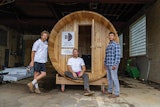


First, though, business owners need to understand what a superintendent is and what role they play. A superintendent is a project manager, a people manager, a budget manager, and a client manager all rolled into one. They can be responsible for a wide range of duties, from estimating costs and ordering materials to performing inspections and ensuring industry standards are met. Superintendents also often wrangle the subcontractors and keep everyone focused on the job at hand, regardless of any personality conflicts.
WHAT IT TAKES TO BE A SUPERINTENDENT
With such a broad scope of responsibilities and skills needed to manage them, how do you find such people? Baxter, who is a PHTA-Certified Advanced Pool Builder Professional and GENESIS instructor, believes that successful superintendents possess two fundamental character-based qualities: 1) the ability to follow through on what they promise to do, and 2) the willingness to be honest about what they see and tell the truth.
Almost everything else can be taught while on the job. For example, “a certified welder doesn’t show up certified,” he says. “You send him to school or you send him to certification programs, and he learns the structure and guidelines.” Superintendents are the same way: They don’t magically appear on the jobsite, but they can be taught the key components of the job.
According to Baxter, supervision is not about having the best technical skills or the deepest technical knowledge. “Supervision is about knowing the right questions to ask and knowing where to get the right answers.”
It is also important for a superintendent — and, honestly, any business owner — not to be a micromanager. “If you limit the ability of your people to perform, if you limit their ability to choose and decide, the company can’t grow,” Baxter explains. “You have to learn to trust your employees. Delegate and let your employees make decisions. That’s how a company flourishes.”
Superintendents are responsible for protecting the company while also keeping the client informed. “We define it as having great strength and blind courage to take on any impossible task, demonstrating extraordinary powers while caring for the client and achieving timely completion safely,” Baxter says, only slightly tongue-in-cheek. “And the superintendent has to do that with a courteous smile and a positive attitude, without killing anybody or taking prisoners.”
THE IMPORTANCE OF STRUCTURE
Superintendents do best in an environment that provides a structure that can be replicated for every project, whether it’s a tiny backyard plunge pool or a massive commercial aquatic facility. What Baxter hopes a company can provide for their superintendent — or what the superintendent can learn to create themselves — is a straightforward path to successful completion: “here’s the list, follow the instructions, check the boxes,” he says.
The most common mistake Baxter sees in the industry is the lack of a schedule. “If there is no plan, how can you follow it?”
Baxter is a big believer in Gantt charts, a project management tool that allows you to visually follow every step of the process for every project. “You can basically put all of your projects up on the wall in chart form and see which ones can or cannot proceed ahead of another,” he explains. “If you treat it sequentially — project one, project two, project three — it’s an easy way to see that three might be able to go ahead of two on a certain day or because of a certain circumstance. You’re able to see it all right there on the wall.” Digital Gantt charts are also readily available in a variety of time management software, including Microsoft.
THE ROLE OF RECORDKEEPING
Part of managing a business is proper documentation, recordkeeping, and the ability to use those records effectively to ensure the product is delivered as planned, Baxter says.
“Pools last a long time. You don’t want to dig up a time capsule, but you do want to have the records for yourself or the homeowner in case anyone needs to know the components, the parts, the construction documents, change orders, warranties — all of it. If you’re being paid well for the service you provide, recordkeeping should be part of the service itself.”
Superintendents are responsible for this recordkeeping. The records should include all of the communications between the company, the homeowner, and the subcontractors; the milestones and inspections; and any incumbrances or problems that were encountered along the way and how they were resolved.
These records can be helpful for a number of reasons. Whether there is a warranty issue, a legal dispute, or even a future remodel job, these records serve as “the encyclopedia of the project,” as Baxter calls them.
EDUCATION IS KEY
Baxter is looking forward to teaching a brand-new GENESIS course at the Expo in November. The course, called C393: Construction Superintendent: Connecting the Field with the Home Office, is designed to “bring about a structure that is capable of being consistently replicated to maintain and hit the estimate of the budget,” he explains. “The course will provide tools to detect deviations and make corrections or intercede long before a problem becomes major.”
The course has seven objectives:
- Define what an organizational structure should look like to be functional.
- Understand what policies and procedures are paramount for that system to function.
- Provide basic management training.
- Identify the functions performed by the construction management team and why they are essential.
- Create guidelines for oversight to ensure accountability of the work and product quality.
- Establish job opening procedures.
- Establish job closeout procedures.
The course will also offer students a toolbox of sorts, with recommendations that can be adopted by a company to streamline processes.
On teaching his first course, Baxter says, “What greater responsibility do we have than to return what we took from an industry that provided us the ability to sit where we are today?”
This article first appeared in the September 2024 issue of AQUA Magazine — the top resource for retailers, builders and service pros in the pool and spa industry. Subscriptions to the print magazine are free to all industry professionals. Click here to subscribe.












































